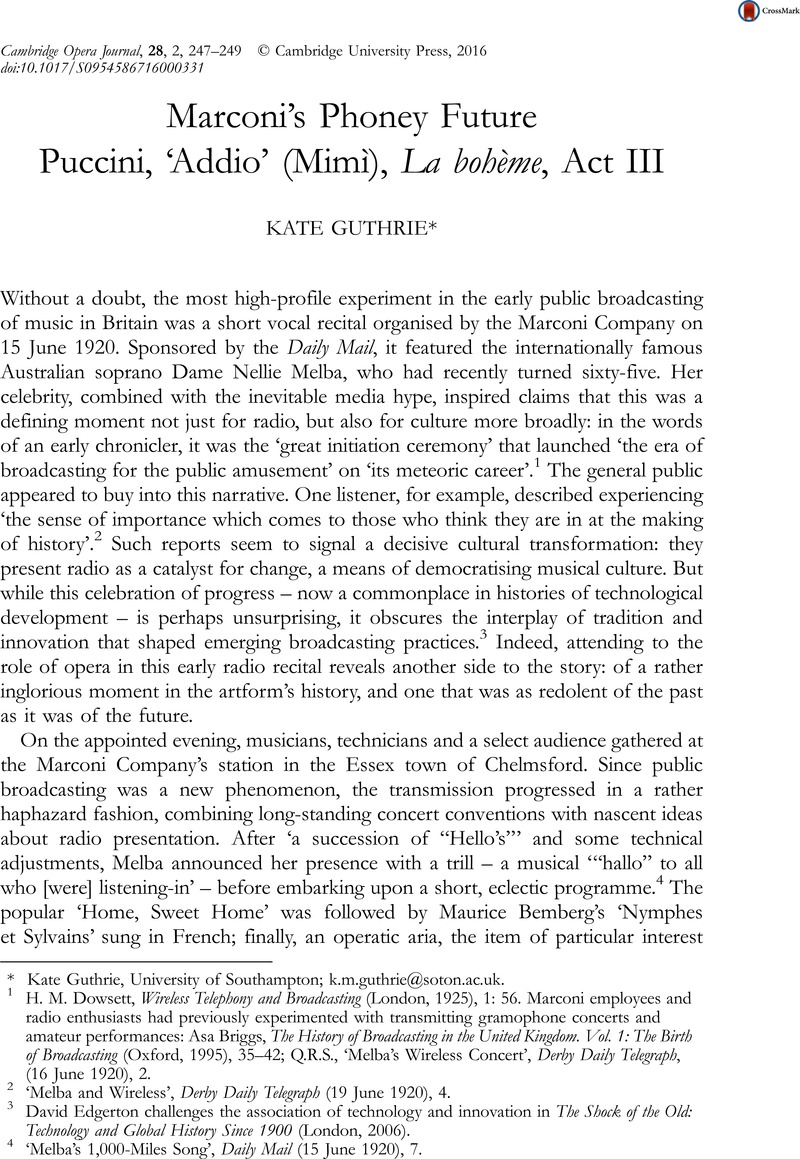No CrossRef data available.
Article contents
Marconi’s Phoney Future Puccini, ‘Addio’ (Mimì), La bohème, Act III
Published online by Cambridge University Press: 28 September 2016
Abstract

- Type
- Research Article
- Information
- Cambridge Opera Journal , Volume 28 , Special Issue 2: Special Issue: Remaking the Aria , July 2016 , pp. 247 - 249
- Copyright
- © Cambridge University Press 2016
Footnotes
Kate Guthrie, University of Southampton; k.m.guthrie@soton.ac.uk.
References
1 Dowsett, H. M., Wireless Telephony and Broadcasting (London, 1925), 1: 56 Google Scholar. Marconi employees and radio enthusiasts had previously experimented with transmitting gramophone concerts and amateur performances: Briggs, Asa, The History of Broadcasting in the United Kingdom. Vol. 1: The Birth of Broadcasting (Oxford, 1995), 35–42 Google Scholar; , Q.R.S., ‘Melba’s Wireless Concert’, Derby Daily Telegraph, (16 June 1920), 2 Google Scholar.
2 ‘Melba and Wireless’, Derby Daily Telegraph (19 June 1920), 4.
3 David Edgerton challenges the association of technology and innovation in The Shock of the Old: Technology and Global History Since 1900 (London, 2006).
4 ‘Melba’s 1,000-Miles Song’, Daily Mail (15 June 1920), 7.
5 The aria is properly known as ‘Donde lieta uscì’.
6 For more on how technological advances intersected with established performance practices, see Tunbridge, Laura, ‘Frieda Hempel and the Historical Imagination’, Journal of the American Musicological Society 66 (2013), 439 Google Scholar.
7 ‘[S]cores of scattered audiences must have wondered how they could beg for an encore. As though their thoughts had travelled through the air, a response was forthcoming.’ ‘Melba Concert by Wireless’, Gloucestershire Echo (16 June 1920), 3.
8 Melba had not in fact been involved in the opera’s unsuccessful 1897 London premiere; however, she took the credit for initiating the 1899 revival that established the opera in the repertory; see Hetherington, John, Melba: A Biography (London, 1973), 98–99 Google Scholar.
9 B., ‘Melba – Queen of Song’, Daily Mail (15 June 1920), 6.
10 ‘Melba – Queen of Song’.
11 ‘Melba Sings by Wireless’, Daily Mail (16 June 1920), 7.
12 ‘Music in the Provinces’, The Musical Times 61 (July 1920), 491.
13 It would be a few more years until operas were first broadcast in their entirety, and before critics began to predict that radio might be the saving grace for this supposedly dying art form. For example, ‘Do We Care About Opera?’, The Listener (24 April 1929).
14 Put simply, the problem with Puccini’s music was its popularity; see, for example, Parker, D. C., ‘A View of Giacomo Puccini’, The Musical Quarterly 3 (October 1917), 509–516 CrossRefGoogle Scholar; and Wilson, Alexandra, The Puccini Problem: Opera, Nationalism and Modernity (Cambridge, 2007)CrossRefGoogle Scholar.
15 ‘Melba and Wireless’.
16 ‘Melba and Wireless’.
17 ‘Melba’s Song to the World’, Daily Mail (14 June 1920), 5.
18 ‘Dame Melba Singing in Chelmsford Heard at Exeter’, Western Times (16 June 1920), 2.
19 ‘Melba’s 1,000-Miles Song’.
20 ‘Melba at 1,033 Miles’, Daily Mail (21 June 1920), 7.




